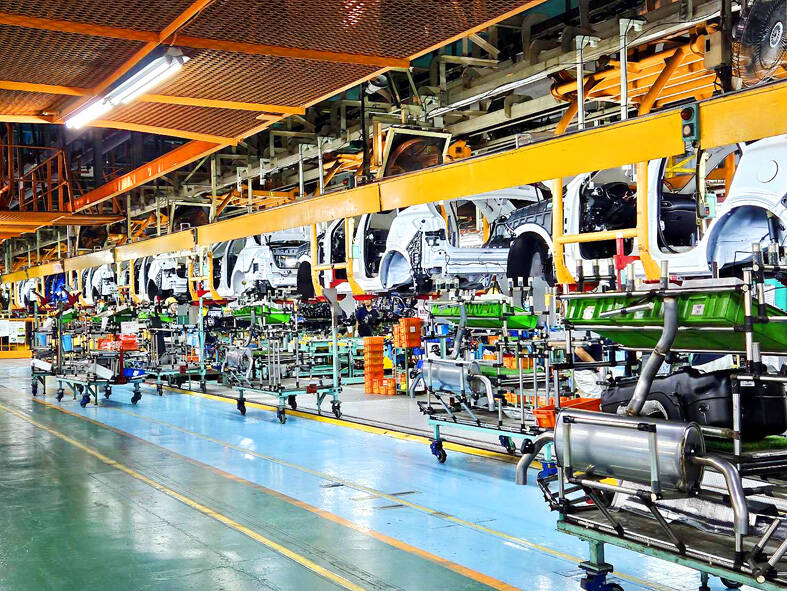Reducing import tariffs on complete vehicles would weaken the domestic automobile and automotive electronics industries, the Taiwan Transportation Vehicle Manufacturers Association (台灣車輛公會) said yesterday, while expressing hope that the government would pay more attention to the long-term development of domestic industries.
In a statement issued after US President Donald Trump announced the imposition of a 25 percent tariff on imported vehicles starting on Wednesday next week, the Taipei-based association said that the higher levies imposed by the US would have little impact on Taiwan’s automobiles and Trump’s purpose is to expand the establishment of production facilities in the US by global automakers.
Taiwan should not unconditionally and proactively reduce import tariffs on complete vehicles in response to the US move or it would have an irreparable effect on the entire automobile industry chain in Taiwan, the statement said.

Photo courtesy of the Taiwan Transportation Vehicle Manufacturers Association
“Tariffs are an important policy tool for international trade and industrial development,” it said. “The US set the tariff rate for passenger cars at 2.5 percent before the imposition of new tariffs, but places a 25 percent tariff rate for pickups, which are popular in the US, as it wants to keep them made in the US.”
Vehicle exports to the US are relatively low compared with other countries, it added.
Taiwan imports about NT$30.3 billion (US$915.32 million) of vehicles a year from the US, while it exports about NT$3 billion to the US, the association said, citing Ministry of Finance data.
“Auto tariffs involve trade balance issues and relevant policies need to be carefully evaluated,” it said.
If the government reduces tariffs on imported passenger vehicles to zero, or to 2.5 percent from 17.5 percent, it would lead to the loss of tax revenue and undercut the competitiveness of Taiwan’s automobile industry, the statement said.
That would negatively affect firms throughout the supply chains of the domestic automobile and automotive electronics industries, which generated a combined production value of NT$994.8 billion last year, it added.
The government should conduct a comprehensive and prudent assessment when formulating tariff policies and take into account the long-term development of domestic industries, as the auto industry involves large industrial chains including steel, plastics, rubber, glass, machinery, motors, electronics and other services, the association said.

Application-specific integrated circuit designer Faraday Technology Corp (智原) yesterday said that although revenue this quarter would decline 30 percent from last quarter, it retained its full-year forecast of revenue growth of 100 percent. The company attributed the quarterly drop to a slowdown in customers’ production of chips using Faraday’s advanced packaging technology. The company is still confident about its revenue growth this year, given its strong “design-win” — or the projects it won to help customers design their chips, Faraday president Steve Wang (王國雍) told an online earnings conference. “The design-win this year is better than we expected. We believe we will win

Intel Corp chief executive officer Lip-Bu Tan (陳立武) is expected to meet with Taiwanese suppliers next month in conjunction with the opening of the Computex Taipei trade show, supply chain sources said on Monday. The visit, the first for Tan to Taiwan since assuming his new post last month, would be aimed at enhancing Intel’s ties with suppliers in Taiwan as he attempts to help turn around the struggling US chipmaker, the sources said. Tan is to hold a banquet to celebrate Intel’s 40-year presence in Taiwan before Computex opens on May 20 and invite dozens of Taiwanese suppliers to exchange views

Chizuko Kimura has become the first female sushi chef in the world to win a Michelin star, fulfilling a promise she made to her dying husband to continue his legacy. The 54-year-old Japanese chef regained the Michelin star her late husband, Shunei Kimura, won three years ago for their Sushi Shunei restaurant in Paris. For Shunei Kimura, the star was a dream come true. However, the joy was short-lived. He died from cancer just three months later in June 2022. He was 65. The following year, the restaurant in the heart of Montmartre lost its star rating. Chizuko Kimura insisted that the new star is still down

While China’s leaders use their economic and political might to fight US President Donald Trump’s trade war “to the end,” its army of social media soldiers are embarking on a more humorous campaign online. Trump’s tariff blitz has seen Washington and Beijing impose eye-watering duties on imports from the other, fanning a standoff between the economic superpowers that has sparked global recession fears and sent markets into a tailspin. Trump says his policy is a response to years of being “ripped off” by other countries and aims to bring manufacturing to the US, forcing companies to employ US workers. However, China’s online warriors